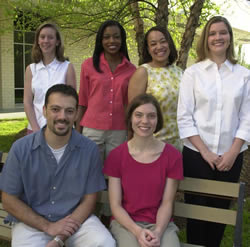Six medical students named Schweitzer Fellows
Six medical students at the Brody School of Medicine at East Carolina University are working to improve the health of eastern North Carolina and have been recognized for their efforts as North Carolina Schweitzer Fellows for 2003-04. ECU had more Schweitzer Fellows this year than any other North Carolina medical school.
In North Carolina, 21 medical students were chosen as fellows. The Albert Schweitzer Fellowship continues the legacy of Dr. Albert Schweitzer, who is viewed as one of the great humanitarians of the 20th Century. The fellowship was founded in 1940 to support the work of Schweitzer in Lambaréné, Gabon, during World War II. Since that time, the fellowship has continued to support the hospital there as well as other programs and began sponsoring local programs to address unmet health care and social needs in the U.S.

The six Schweitzer Fellows from ECU for 2003-04 are, left to right, front row, Nathan Meltzer and Mary Dawson; second row, Cameron Anderson, Cherisse Thomas, Kimberly Alexander-Bratcher and Caroline Morgan. Photo by Cliff Hollis
The fellows from the Brody School of Medicine and their community service projects are as follows:
— Kimberly Alexander-Bratcher, a first-year medical student, will be educating Latino women about prenatal care and breastfeeding at the Kate B. Reynolds Pediatric Center in Greene County. As part of her preparation and research, she will participate in a medical mission to Cuba. Alexander-Bratcher is a native of Salisbury and is co-president of the Student National Medical Association at ECU. Alexander-Bratcher said that through her project she plans to increase the awareness and understanding of the benefits of breastfeeding to mothers and children, increase the number of mothers at the center who breastfeed, increase the support provided for breastfeeding mothers and improve the cultural competence of health care professionals at the center.
— Cameron Gram Anderson, a third-year medical student, will implement “Super Kids – Healthy for Life,” an exercise and nutrition-training program for elementary-aged overweight children of Pitt County in which they will train for several months to run a one-mile race next March. A native of Fayetteville, Anderson will assign each “Super Kid” to a special-needs child in the Family Support Network of Eastern Carolina to sponsor through their training efforts. All money given by corporate and private donors will go toward fulfilling the wish of each special-needs child, she said. She said her project has three primary goals: to develop a love of exercise in the Super Kids that can continue through their lives, to raise money to fulfill the wishes of children in the Family Support Network and to allow children to experience the benefits of working hard for to help others.
— Mary Dawson and Nathan Meltzer will coordinate breast, colorectal and prostate cancer screenings and conduct cancer education workshops at HealthAssist centers in Pitt County. “My interest is to learn how HealthAssist does its job, and the best way to do that is to work with them,” Meltzer said. “Statistics show that people without access to care present to physicians with higher rates of disease. Our idea is to move the current screening efforts out of Greenville and into the communities.” Meltzer is a native of Washington state. Dawson is from Greenville.
— Caroline Morgan, who grew up in New Bern and Crossville, Tenn., will address healthy eating and physical activity levels through workshops called “Body Basics” at the Pitt County Boys & Girls Club. “Obesity is an epidemic in the United States, North Carolina and more so in eastern North Carolina,” she said. “I want to provide elementary school children and their parents a way to improve their physical activity and nutrition. Intervention is the key to improving the rapid spread of the obesity epidemic.” Morgan plans to teach separate workshops to children ages 6 to 12 and their parents. Topics will include fun and easy exercises, appropriate portion sizes and the food guide pyramid. “These topics are designed to equip children with the knowledge to make healthy decisions.